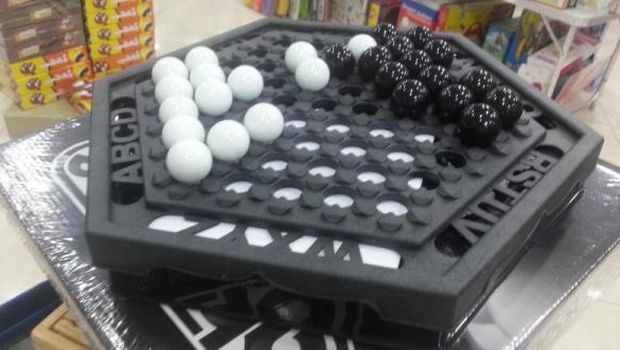
“Siege,” an award-winning Spanish game and one of a recent string of additions to the Saudi toy market aimed at boosting children’s problem-solving and creative abilities. (Asharq Al-Awsat)
Riyadh, Asharq Al-Awsat—A new trend has emerged in the children’s toy market in Saudi Arabia. Parents are increasingly choosing toys that claim to develop their children’s intelligence and creativity. Asharq al-Awsat spoke to several people working in the industry, who say there is now a general trend toward these products, with a string of shops specializing in educational toys now opening across the country.
At one such outlet, the Durar Al-Huda toyshop, sales and marketing manager Mohamed Khabbaz said that having monitored the market for some time the shop decided to choose this niche after noticing an increasing demand for toys that developed children’s intellectual abilities. But Durar Al-Huda was not just reacting to a market trend. Khabbaz said the shop sought to actively promote it, which the Saudi market has taken to at an astonishing speed.
Khabbaz contrasted educational toys, which are usually manufactured in Asian countries such as China and Malaysia, with the video games that have recently flooded the Saudi market, noting that educational toys benefited children’s thinking, intelligence and self-development abilities, which in turn benefited their school performance and everyday life. Video games, he said, provided no such benefits as they focused solely on entertainment.
Salem Bin Obaid-Allah, a salesman at a toyshop in Riyadh, has noticed a decrease in his customers over the past two years, a result due not only to the shop owners’ decision to ban the sale of video games, but also to the recent spread of shops specializing in educational toys. A unique feature of these toys and games, he said, was that they could be enjoyed by both children and adults, with the latter finding them just as challenging and fun as the former.
Some of the toys include products such as “Smart Circles,” a variant of the classic tic-tac-toe, made up of 16 circles placed on a four-by-four grid and varying in both size and color. Like the classic game on which it is based, players aim to cover a row of circles—four in this case—starting with the largest. Another is “Siege,” an award-winning strategy game manufactured in Spain, which consists of a six-sided board not unlike a chessboard. Divided into two parts, with each part colored differently, the object of that game is to transfer a number of balls to the opponent’s side of the board following very restrictive rules, which limit both the number of balls in play and the direction in which they can travel.
Obaid-Allah has noted how popular these educational toys have become, seeing a great demand for them not only from parents but also from the children themselves—which can only be a good thing.
